Do you want to introduce subscriptions in your ecommerce business? Read this guide for a list of the best ecommerce platforms for subscription businesses.
Key takeaways
- Modern subscription platforms eliminate manual spreadsheets and handle payments, billing, and fulfillment in one place.
- Platform choice depends on your needs: some offer full-service solutions while others specialize in payments or subscription management only.
- Pricing models vary significantly, from free tiers with transaction fees to premium packages costing $249+ monthly.
The subscription business model feels like it’s everywhere today, from streaming services like Netflix to creative tools like Canva. The fact that everybody’s trying to get into makes sense, since it’s so healthy for a business to have—and if you already have one, or are just looking to start a subscription-based business, you’re still ahead of the game.
With subscriptions, though, the trick is to find a platform that can make it happen without having to do too much work yourself. Back in the day, membership businesses like gyms and golf clubs used to have far too many filing cabinets and spreadsheets for their own good.
Today, all of that can be taken care of by a solid platform—but that’s not all. Truly great ecommerce platforms not only handle your subscriptions, they can take over several areas of your business, lightening your workload and letting you spend more time improving your products and delighting your customers.
So, let’s take a look at some of the ecommerce platforms that could help you streamline your operations and maximize the revenue you can expect from your subscriptions!
15 best ecommerce platforms for your subscription business
🏅1. Whop
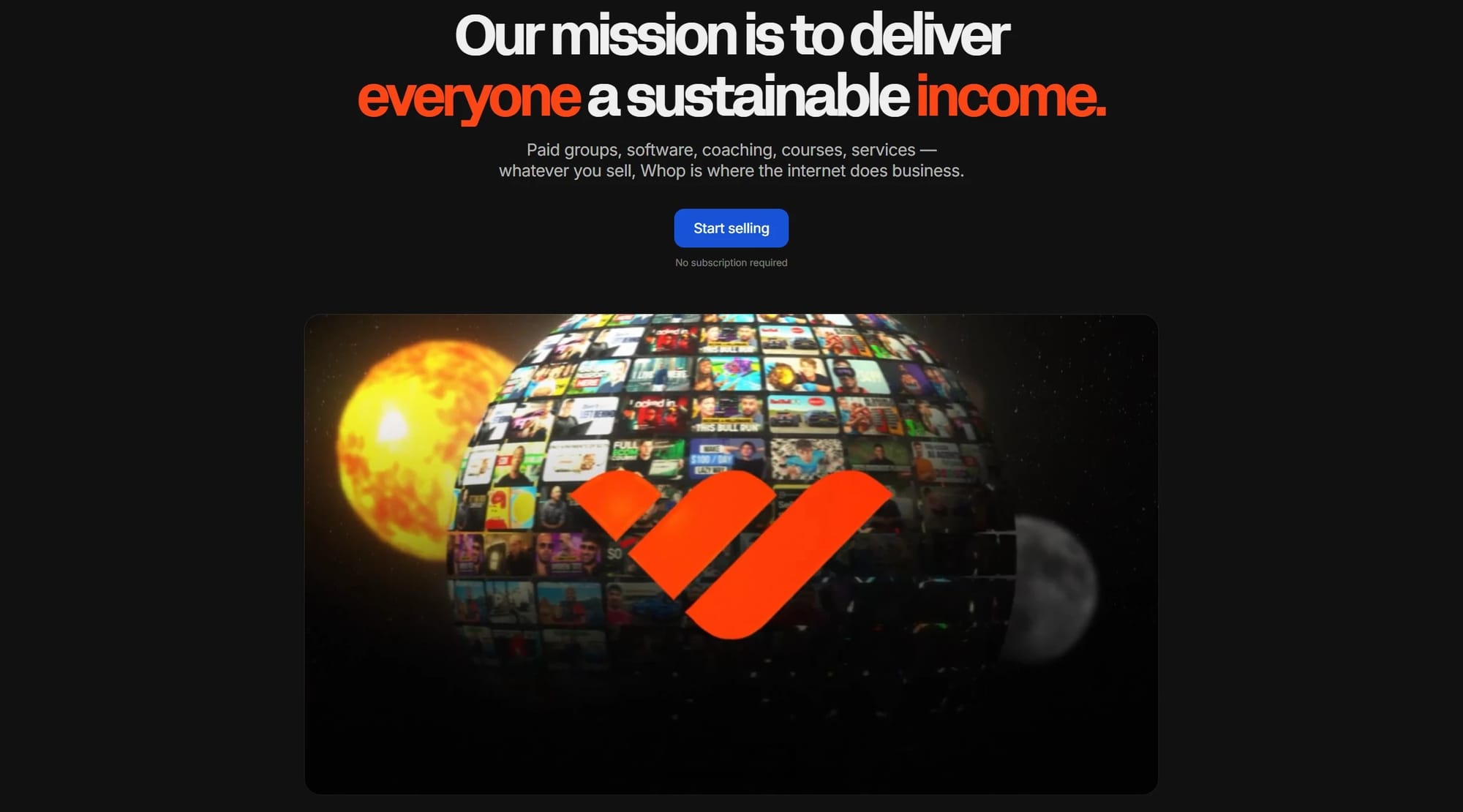
Whop is a platform that’s taking the ecommerce scene by storm, providing online businesses with an all-in-one platform that takes care of everything from payments to digital fulfillment in order to allow business owners the time and freedom they need to keep creating. Already home to close to 20,000 active sellers and with 7 million memberships sold to date, Whop has made subscription business a form of art.
With Whop, you can customize your operation however you like. It’s extremely easy to set up a storefront and a community, and you can just drag in the features you want—if you want your members to be able to chat, it’s just a matter of adding the Chat app to your Whop Hub by dragging and dropping it in, if you want to sell access to ebooks, simply add the files app.
This incredibly easy interface hides a powerful structure, and Whop serves as your Merchant of Record while offering a payment infrastructure system based on Stripe. From extremely responsive customer service to secure digital fulfillment and best-in-class pricing, it’s really hard to look past Whop if you want to do subscriptions right.
Whop at a glance:
Pricing: Free to use, plus a 2.7% + $0.30 platform fee on transactions. Bespoke pricing is also available, so you can talk to sales if you anticipate bringing in high volumes or sales of over $50,000 per month.
Pros: Extremely easy to get set up and use, and you can build your Whop Hub and storefront in seconds. A true all-in-one platform
Cons: Not yet as established as a couple of other names on this list
Best For: Content creators and most digital entrepreneurs looking to monetize via subscriptions
2. Shopify

Shopify is a legitimate ecommerce giant, hosting millions of merchants across 170] countries and encompassing a staggering 10% of total US ecommerce. It offers a full-service option for entrepreneurs including recurring billing, payment processing, shipping, and subscription management.
There’s nothing that Shopify doesn’t give you as a merchant, so it’s all about picking the right plan to ensure that you’re getting exactly what you need for the right price. It’s a good idea to keep an eye on how much of a shipping discount you get too if you’re dealing with physical products, with some of the higher-tier plans being more efficient for physical fulfillment. 3rd party payment provider fees also go down as you choose higher-end plans.
Shopify at a glance:
Pricing: Starts at $29 per month with the basic plan, plus 2% fee for 3rd party payment providers and 2.9% + $0.30 for online transactions. The intermediate Shopify plan is priced at $79, and their top-tier plan costs $299 per month paid annually.
Pros: Established platform with a sterling reputation and caters to all sorts of ecommerce companies large and small
Cons: You may be paying for features, such as POS services, that you don’t need at all
Best For: Smaller ecommerce ventures looking to sell physical products such as merchandise
3. Stripe
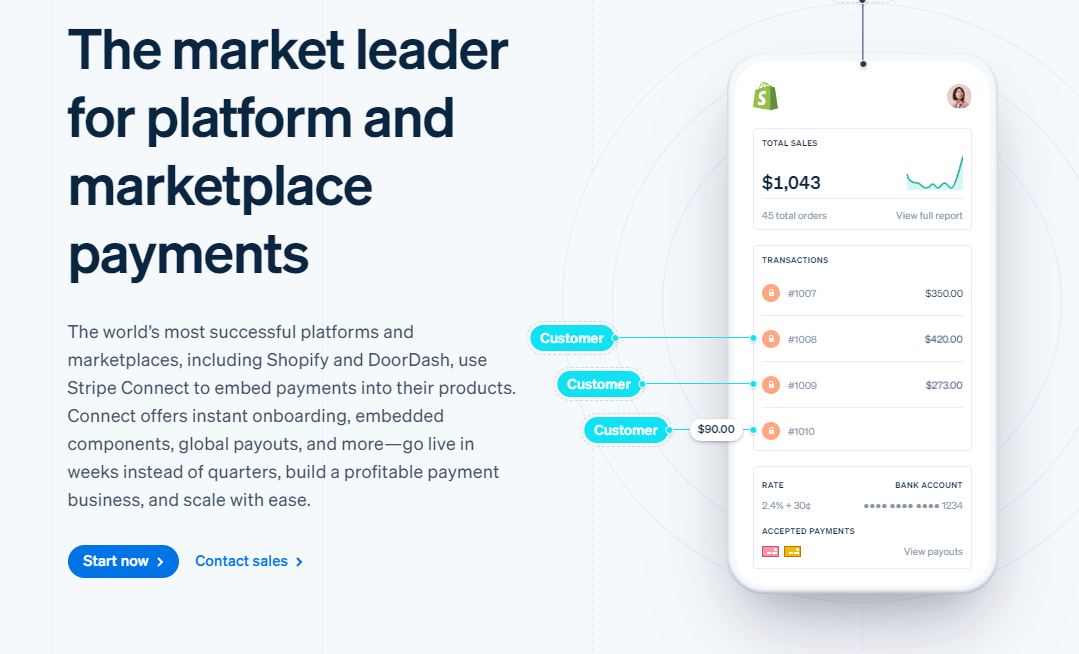
Stripe is a giant in the world of payment processing, but as long as you don’t need a full-service provider it’s a fantastic choice to take over your till. It goes without saying that Stripe offers recurring billing, and it accepts just about any sort of payment you can imagine while also being fully compliant and providing 24/7 support.
Subscription management falls under the Stripe Connect umbrella, and your business needs might even be met under its free plan. Custom packages are also available if your business has a particularly unique model or especially large volumes, and you may also be able to take advantage of country-specific rates.
Stripe at a glance:
Pricing: Free, with a 2.9% + $0.30 transaction fee to process payments.
Pros: One of the most trusted payment platforms available
Cons: Doesn’t offer a full service platform for ecommerce
Best For: Businesses of all sizes needing top-notch payment processing
4. BigCommerce

BigCommerce is a publicly listed ecommerce platform that makes doing business online easy. It’s all about customization, melding the best features of the Software-as-a-Service model and API-enabled integrations, letting you take advantage of best in class speed and agility to boost sales and growth.
This is a platform with services tailored toward other cutting-edge companies, but they do have a range of plans on offer if you want to start small and scale with them. The model operates without transaction fees, but you’ll need to add subscription management features to your account via app integration.
BigCommerce at a glance
Pricing: You can sign up for the BigCommerce Standard plan for just $29 per month billed annually, but for advanced features such as customer segmentation, cart abandonment and product filtering you’ll have to go up to Plus at $79 or Pro at $299.
Pros: Full service ecommerce platform with all the features you need plus subscription management via integration
Cons: Many crucial features are paywalled behind more expensive plan tiers
Best For: Larger ecommerce companies willing to go with Pro or bespoke pricing
5. Subbly
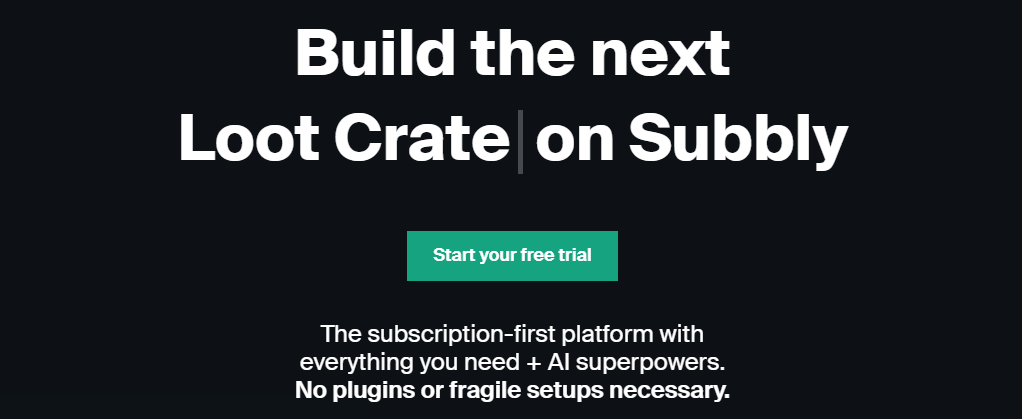
Subbly is a subscription-focused ecommerce platform that makes it as easy as possible to get started. You don’t need any sort of coding knowledge to get started, and once you’re on board, you can take quick advantage of features like tiered subscription plans and mid-purchase upsells.
You can set up your online storefront on Subbly using the platform’s drag and drop builder and professional templates, and digital products are handled with the same ease as physical ones—all of this without needing to resort to plugins.
Subbly at a glance
Pricing: Subbly’s pricing starts like several other options on this list at $29 per month, but there are several tiers to choose from and their featured Advanced tier is priced at $119.
Pros: Subbly is laser-focused on the subscription business model, so you’ll find just about every business need taken care of
Cons: Basic plan is extremely limited
Best For: Businesses needing a specialist subscription platform
6. Recurly
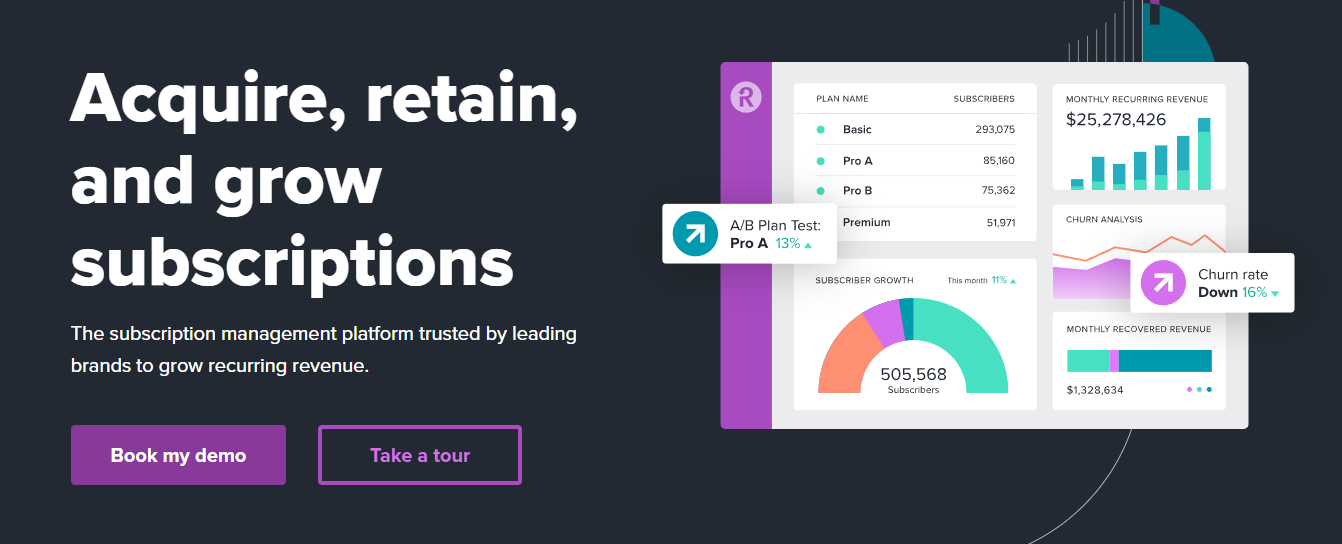
Recurly is a subscription management specialist that understands the ins and outs of companies that devote themselves to the pursuit of recurring revenue. The platform plays nice with other software that you might already use, integrating very easily, and its analytics and reporting features can give you a significant edge.
Recurly focuses on enhancing your customer lifecycle via options in terms of plans and promotions, while its churn management provides an extra boost that many other platforms can’t match. It’s a solid platform while also being flexible and customizable, but is admittedly on the expensive end of the scale.
Recurly at a glance
Pricing: Formerly called Core, the Starter package is priced at $249. Beyond $40,000 in revenue per month, Recurly also levies a 0.9% fee.
Pros: Provides all the features you need to run a subscription-based business
Cons: Premium option that may be unaffordable for entrepreneurs just starting out
Best For: Online businesses who are already established and looking to scale
7. Wix

Wix is an ecommerce platform powered by a rock-solid website builder and using it as a springboard to offer a suite of business solutions. It’s a fantastic choice if you want to start with a new site of your own and work your way up, letting you leverage AI, customizable templates, and a whole host of design features to get started.
With your site as the core, you can build out your business however you want, and that includes running a subscription-focused model. It’s noteworthy that you only get a free domain for a year, but it’s the full white label experience on all plans, with no Wix branding in sight.
Wix at a glance
Pricing: The Light plan costs $17 per month but is extremely limited. You’ll need Core at $29 just to unlock payments, with more powerful ecommerce options available with Business at $36 and Business Elite at $159.
Pros: One of the most powerful website builders you can find
Cons: Wix is focused on websites above all else, so you may not find every feature you need
Best For: Businesses that want to make their website the core of their operation
8. Square

Square is primarily a payment processing service, but subscription management is very much part of the business model they offer. That being said, you won’t find other common features such as virtual storefronts and shipping, so it’s a great option to make part of your stack rather than a candidate to take over your entire operation.
Square’s Online Checkout service includes recurring billing and subscription management, and it offers several different features that can come in clutch—and even the free plan comes in with the goods, including automating payment reminders.
Square at a glance
Pricing: Starts with the Free plan, while Plus costs $29. Both of these options as well as Square’s bespoke model all involve transaction fees on top of any flat charges.
Pros: Free plan offers plenty of mileage if all you need is a solid payment platform
Cons: Doesn’t offer features such as an online storefront for your business
Best For: Any firm needing a solid, reliable payment processor and no more
9. Adobe Commerce

Formerly known as Magento, Adobe Commerce retains its open source roots and provides merchants with a powerful range of specialized features designed to enhance growth. It gives you subscription management via extensions which you need to purchase from the Adobe Commerce marketplace, which means a higher cost than at first glance, but really gets the job done.
You will actually need a little bit of coding prowess (or have a coder on the team) to get the ball rolling with Adobe Commerce and set up your storefront. That makes this one of the harder platforms to get started with, but once you’re set up it’s an extremely powerful ecosystem to use at scale.
Adobe Commerce at a glance:
Pricing: Free to use but you’ll need to purchase the subscription management extension and anticipate other costs
Pros: Powerful Adobe ecosystem and the ability to take advantage of cutting technological innovation
Cons: Difficult to get set up without significant coding expertise
Best For: Larger B2C and B2B businesses with significant resources to deploy
10. Squarespace

Squarespace is another platform that’s well known as a top website builder, but also provides just about everything you need to run a full-fledged ecommerce business. Squarespace definitely doesn’t skimp on the features, and even offers shipping and fulfillment in addition to payments and checkout.
It’s hard to beat Squarespace when it comes to marketing tools as well, with built-in SEO and social media integrations as well as customer engagement and analytics to ensure that your business is operating at full tilt. However, you do have to pay to use the platform, with subscriptions only available on the highest membership tier.
Squarespace at a glance
Pricing: Squarespace starts at $16 per month for their personal option, but you need to go up to the advanced Commerce option at $52 to be able to sell subscriptions.
Pros: Full featured platform with a superb website builder
Cons: Subscriptions are only unlocked at the highest-priced tier
Best For: Small businesses who want to offer subscriptions via their website
11. Chargebee

Chargebee has merchants in 227 countries and territories, and this level of widespread trust is evidence of the platform’s quality in hosting subscription businesses. With billing services, automated revenue recognition, retention mechanisms and proactive collections, Chargebee saves time and money when put in charge of your revenues.
The platform and its Revenue Growth Management system are also easy to integrate with whichever other services you use, supporting over 30 payment gateways to enable seamless payments.
Chargebee at a glance
Pricing: Chargebee has a free plan that only levies a transaction fee after $250k in cumulative billing, while their Performance plan clocks in at $599 per month.
Pros: Free plan offers plenty of value even for established ventures
Cons: Very much a premium option if you do need the sort of features gated behind the Performance plan
Best For: Subscription-based businesses wanting to focus on analytics and optimize retention
12. Podia
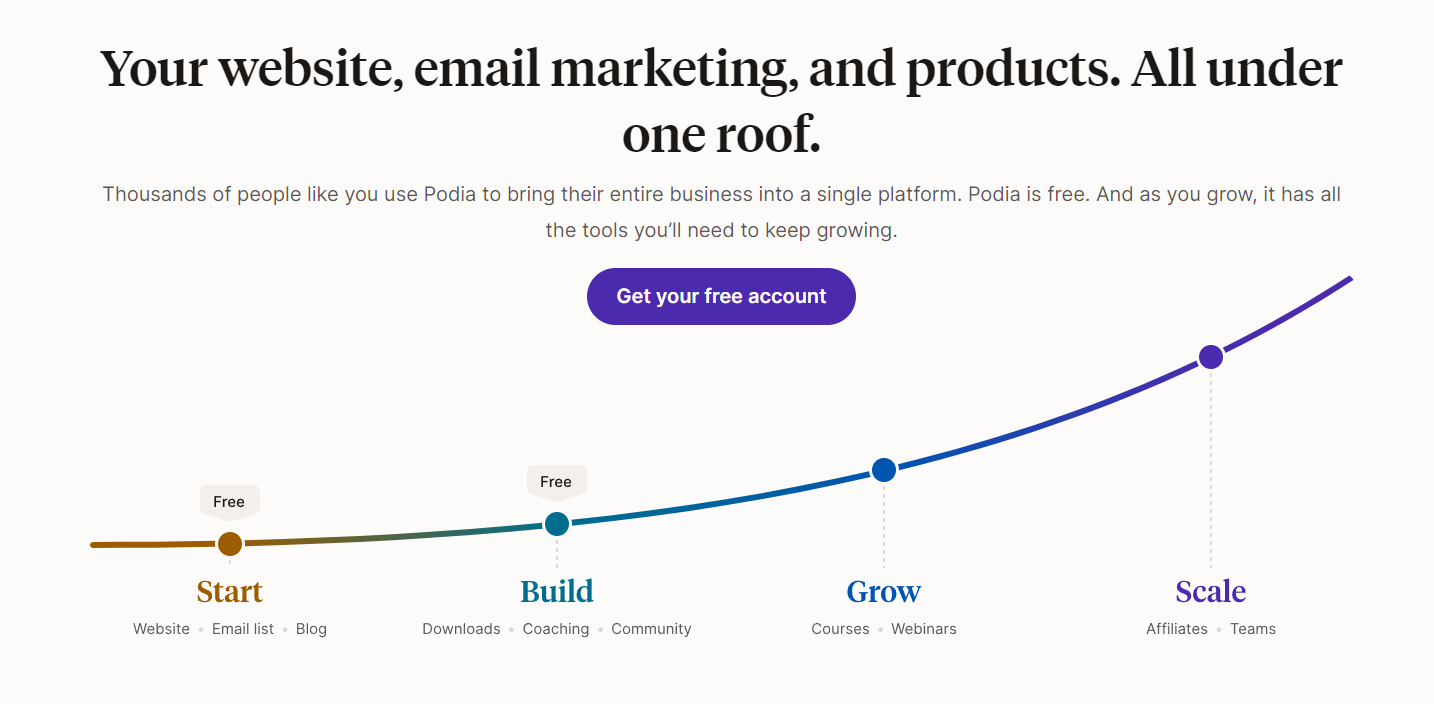
Podia is a website and email marketing platform that’s all about giving your brand a clean, professional look. While the level of customization on offer is slightly limited, Podia does a great job unifying your brand under an extremely appealing aesthetic—and it provides plenty of support with your ecommerce operations too.
The platform combines the flat fee model with transaction-based pricing, so there’s an option for established businesses and fresh starters alike. You’ll want to move through the plans to get away from high transaction costs sooner rather than later, but that’s still not very taxing on your finances as Podia is far from the most expensive option on this list.
Podia at a glance
Pricing: There’s a free plan with 10% fees, but you can unlock all of Podia’s features via the Shaker plan at just $59 per month and not pay any transaction fees.
Pros: Excellent design and top-notch email marketing
Cons: Limited customization
Best For: Smaller businesses including fresh startups and content creators
13. FastSpring

FastSpring is an ecommerce platform that provides a host of different services for companies around the world including subscription management. The company’s focus is SaaS and software but you can sign up no matter what sort of product or industry you’re dealing with, and FastSpring will do a great job as long as it’s all digital.
Recurring payments is something FastSpring does well, and it provides full Merchant of Record services alongside fraud and risk management, ensuring that you’re fully covered when it comes to payments. However, the platform isn’t very transparent when it comes to pricing—though you can definitely expect to hand over a share of each transaction FastSpring processes for you.
FastSpring at a glance
Pricing: Bespoke, but expect a revenue sharing, volume-based model via transaction fees.
Pros: Easy to integrate and solid Merchant of Record services
Cons: Extremely opaque pricing
Best For: Established subscription businesses shifting a significant volume
14. Sellfy
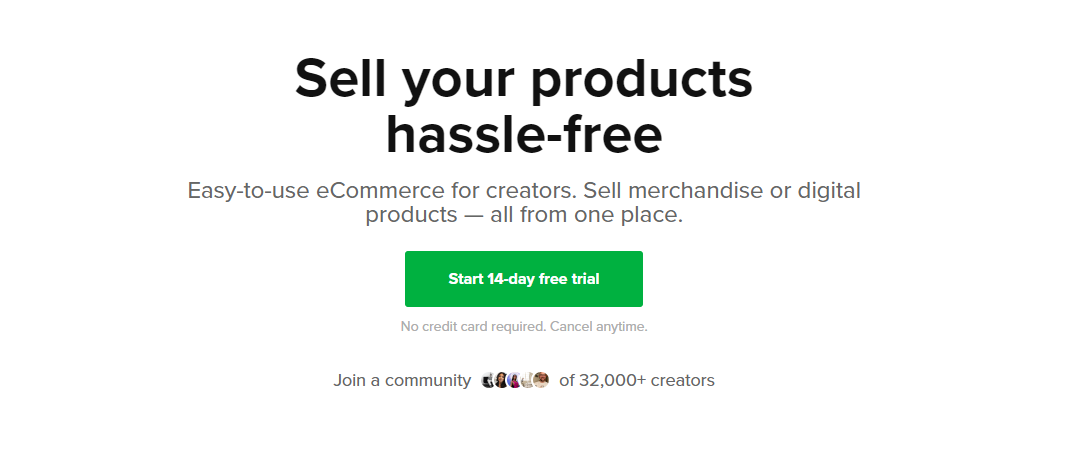
Sellfy is an ecommerce platform targeting creators, helping them set up additional revenue streams via online storefronts selling merchandise and different types of digital products. It’s very easy to get set up, and you can use Sellfy to sell your products anywhere, whether it’s directly on your social media or your own website via a custom storefront.
Given that Sellfy is tailored toward creators, you need to think about your volumes when you decide which plan you choose. The Starter plan, for instance, has a $10k annual sales limit, and even Premium tops out at $200k. If your annual sales are higher, you’ll need to talk to Sellfy about a bespoke plan.
Sellfy at a glance
Pricing: Starter costs $19 per month if billed every two years, going up to Premium at $99 per month. Most of the features you need, including the removal of Sellfy branding, unlock at the $49 Business plan.
Pros: Tailored to creators and offers subscription management features on all plans
Cons: Certain growth features such as affiliate marketing aren’t available on the Starter plan
Best For: Content creators who are just getting started and have begun building their audience
15. Zuora

Zuora is a premium subscription management platform, enabling the maximization of growth for established companies and start-ups on an upward trajectory. It’s very much one of the premium options on this list and doesn’t take sign-ups, meaning that your venture needs to have a certain level of volume before Zuora even becomes an option for you.
That being said, Zuora is a compelling choice for firms which are in the position to sign up with them, and the platform offers services spanning pricing, packaging, billing, payments, and accounting. Machine learning systems are deployed toward failed payments, Zuora’s Zephyr helps you build personalized experiences for your customers, and the platform itself can integrate easily with your existing application ecosystem.
Zuora at a glance
Pricing: Bespoke.
Pros: Premium platform offering a complete suite of subscription management and ecommerce services
Cons: Not accessible or suitable for smaller ventures or creators
Best For: Established companies or SaaS companies
What to look for in an ecommerce platform
With all of the great options to choose from when it comes to Ecommerce platforms for subscriptions, picking the right one for your business can be difficult. To make your choice a little easier, these are the elements you should look for when choosing an ecommerce platform.
Recurring billing
The main advantage granted by the subscription model to a business is recurring billing, which allows you to maintain optimal cash flow. Therefore, you should be eliminating any ecommerce platform that doesn’t offer flexibility in terms of payments or otherwise hinders your ability to bill your customers in exactly the way you want to.
Payment options
On top of the ability to offer recurring payments, the right ecommerce platform should also allow you to take payments in different ways. Your customers may want to pay you using different payment networks including credit cards, third party payment providers, and even cryptocurrencies—and that’s on top of the hundreds of fiat currencies that your customers might be using depending on where they live.
Pricing
In addition to how your ecommerce platform of choice manages payments from your customers, you need to make sure the price is right for you, too. There are generally two payment models out there—some platforms will charge you a percentage of each payment customers make to you, others charge you a flat fee. A few do both. Make sure that the platform you choose has a pricing model that isn’t biting too deeply into your profits.
Customization
Another key factor you need to keep in mind when it comes to choosing an ecommerce platform is just how much customization you’re allowed. While not many platforms offer the full white-label experience, many offer you a lot of leeway when it comes to design and you can take full advantage of that. At the very minimum, you want your branding to be as evident as possible, and your ecommerce platform needs to facilitate that.
Integrations
When you’re building your business, you’re likely going to be taking advantage of several services that can make life easier. All of these softwares need to be able to work with each other and your ecommerce platform needs to play nice with them too—you definitely don’t want to get bogged down manually exporting data and doing other things that clever coding can automate.
Analytics and insights
If you’re serious about making the most out of your business, you’ll already know the importance of analytics and data when it comes to truly understanding your customers, their behavior, and their mindset. A good ecommerce platform can help you by giving you access to as much customer analytics as possible, letting you adopt a data-driven decision-making approach and the confidence and clarity it brings.
Fulfillment
Getting regular payments to your business account is important, but ensuring that your products get to your customers is equally so. Whether physical or digital, your ecommerce platform should take over all aspects of fulfillment, ensuring that your customers have access to your products as soon as possible following the confirmation of their order. Physical product fulfillment is especially critical, since the complexities of storage, picking, packing and shipping all come into play.
Customer service
One of the most often overlooked factors, and wrongly so at that, is customer service. By choosing to use an ecommerce platform for your subscription business you’re putting your customers in the hands of the platform, so make sure that their customer service is up to scratch. Ecommerce can be a difficult prospect at the best of times, so an ecommerce platform with good customer service that’s easy to contact can be an extremely valuable ally to have in your corner.
Manage your subscriptions with Whop!
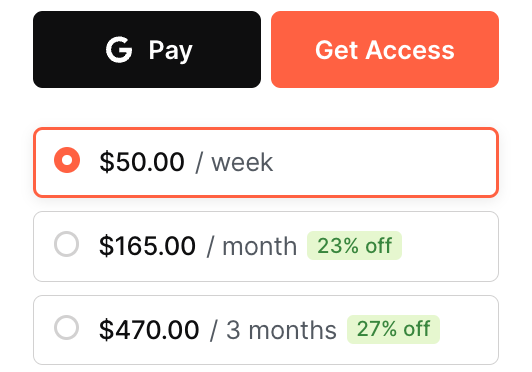
There’s plenty to look at when it comes to picking an ecommerce platform to manage your subscription business, but finding the best match for your needs doesn’t need to be that hard. The best platforms give you access to recurring billing via the payment methods you know that your customers use, and offer pricing models that don’t take too big of a bite out of your revenues.
Factors like customization, available integrations and analytics are important too, and Whop provides you with the most complete option—and that’s irrespective of where you are on your business journey, since Whop’s free, low-fee model makes sense for fresh starters and established businesses alike.
So, if you want to make the most of your ecommerce business by working with a leading all-in-one platform while also ensuring that your subscribers are taken care of by best-in-class digital fulfillment, highly-rated customer service and rock-solid payments, be sure to check out Whop.
FAQs
What is a white label ecommerce platform?
White label refers to a platform that’ll let you put your own branding all over the end product, removing their own branding. For example, a platform that allows you to build an online storefront that has a custom domain and only features your branding, design, and color schemes.
Which ecommerce platform is best for content creators?
One of the most important things for content creators to keep in mind is pricing. Especially when just starting off, there’s no point signing up for a platform that has a high flat fee. Transaction fees in the double digit percentages are also really prohibitive, but free platforms are a great way to get started.
What are the benefits of an ecommerce platform?
An ecommerce platform can help you set up an online storefront, handle payments, take care of fulfillment, provide customer service, deal with billing and invoicing, ramp up your marketing, and a whole lot more. All of this would take a lot of time and resources to do yourself, and in some cases you can get all of this for free, letting you focus on perfecting your product.


